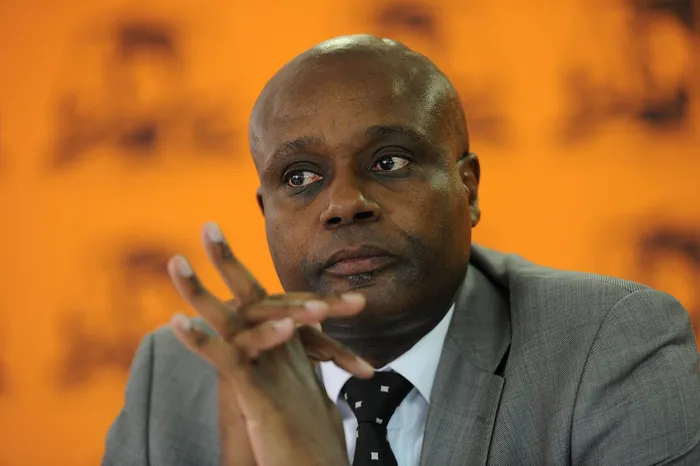
NDPP Shamila Batohi told the Nkabinde Inquiry that documents show Advocate Andrew Chauke was not a mere coordinator in the Cato Manor case, but deeply involved in evidence analysis and core prosecutorial decisions.
Image: Supplied
National Director of Public Prosecutions Shamila Batohi says evidence before the Nkabinde Inquiry shows that South Gauteng Director of Public Prosecutions (DPP) Andrew Chauke was not merely a “coordinator” in the Cato Manor racketeering matter, but was intimately involved in the evidence, decision-making, and later appeal processes.
Testifying before the inquiry chaired by Advocate Bess Nkabinde, Advocate Elizabeth Baloyi-Mere and Matshego Ramagaga, with evidence led by Advocate David Mohlamoynane, Batohi said the documentary trail, including affidavits, internal memoranda and correspondence, revealed that Chauke played a far more substantive role than he publicly claimed.
She argued that the material demonstrated that Chauke “was the DPP in charge of the matter”, and not simply a liaison officer who had no involvement in prosecutorial decisions.
Batohi was taken through a series of documents, starting with her own affidavit, in which she addressed the review application brought by former KZN Organised Crime head, Major-General Johan “Booysen”, who sought to have two racketeering authorisations issued by then-acting NDPP Advocate Nomgcobo Jiba set aside.
Booysen launched his court challenge on April 30 2013, after receiving an indictment supported by 23 investigation dockets, only two of which mentioned him. In those two dockets, witnesses merely placed him at the scenes of shootings after the incidents had occurred.
The Inquiry heard that, in response to Booysen’s challenge, Jiba deposed to an answering affidavit, an affidavit which, according to Batohi, Chauke himself finalised.
She stressed that this was not her characterisation but came directly from Jiba’s own evidence, in which Jiba stated that the answering papers had been prepared by senior counsel and “finalised by Advocate Chauke”, who then provided them to her for signature.
To demonstrate the extent of Chauke’s involvement, Mohlamoynane led Batohi to Advocate Laurance Hodes SC’s consultation notes and to an internal NPA memorandum authored by Advocate Anthony Mosing on June 4 2013.
The memorandum, addressed to Jiba, recorded that Chauke led the entire prosecution team during the consultation with Hodes and Advocate Naomi Manaka regarding the opposition to Booysen’s review.
Batohi pointed out that this corresponded directly with Mosing’s affidavit, in which he stated that the prosecution team, “led by Chauke and I” met with Hodes to prepare for the opposition.
The materials handed to Hodes included the indictment, all dockets, prepared notes, and the prosecution memorandum drafted in August 2012.
When the chairperson, Advocate Nkabinde, raised concerns that earlier evidence suggested Advocate Sello Maema had been the leader of the prosecution team, Batohi clarified that Maema was the technical team lead, whereas Chauke was the DPP in charge of the entire matter.
She told the Inquiry this meant that Chauke was responsible for prosecutorial decisions, strategy, and oversight. “So there is no contradiction,” she said.
“Advocate Maema led the technical team, while Advocate Chauke was the overall person in charge of the prosecution.”
The Inquiry was also taken to Jiba’s affidavit filed in the General Council of the Bar proceedings, where she again stated that Chauke was the DPP in charge of the Booysen prosecution.
In that affidavit, Jiba explained that after consulting with senior counsel, the NPA agreed that Chauke would serve as the liaison between the prosecution team and Hodes SC.
His responsibility included providing counsel with “all the facts and evidence in the dockets” required for preparing the answering affidavit.
Batohi said this was crucial because Chauke had, in the GCB proceedings, attempted to portray himself as a mere coordinator with limited knowledge of the evidence.
She argued that the documentation contradicted this. She also referred the Inquiry to the confirmatory affidavit signed by Chauke, in which he affirmed the role described by Jiba.
Further, the Inquiry was directed to Dr Broughton’s supplementary opinion, which highlighted Chauke’s later involvement in the state’s consideration of an appeal in the Booysen matter.
Batohi said the extract showed Chauke making substantive suggestions to senior counsel on the appeal, which, she argued, amounted to taking prosecutorial decisions.
“Taking a matter on appeal is a prosecutorial decision,” she said. “His involvement in the appeal process goes directly to the question of his role. He was not simply coordinating logistics; he was participating in strategic decisions.”
When Advocate Nkabinde pressed her to clarify whether she was correcting an earlier answer that had seemed to separate Chauke’s knowledge of the case from his involvement in decision-making, Batohi maintained she had made no mistake.
She said her evidence consistently showed that Chauke’s level of knowledge, combined with his conduct, indicated direct participation in prosecution decisions, including the appeal strategy.
She added that the internal memo, Jiba’s affidavit, and Chauke’s own confirmatory affidavit all confirmed the same fact: Chauke was deeply embedded in the case and had authority over the prosecution team.
“His role, as reflected in these documents, is inconsistent with the claim that he was merely a coordinator,” she told the Inquiry.
“These materials demonstrate that he was acting as the DPP in charge and engaged in the decision-making processes throughout,'' she said.
hope.ntanzi@iol.co.za
IOL Politics